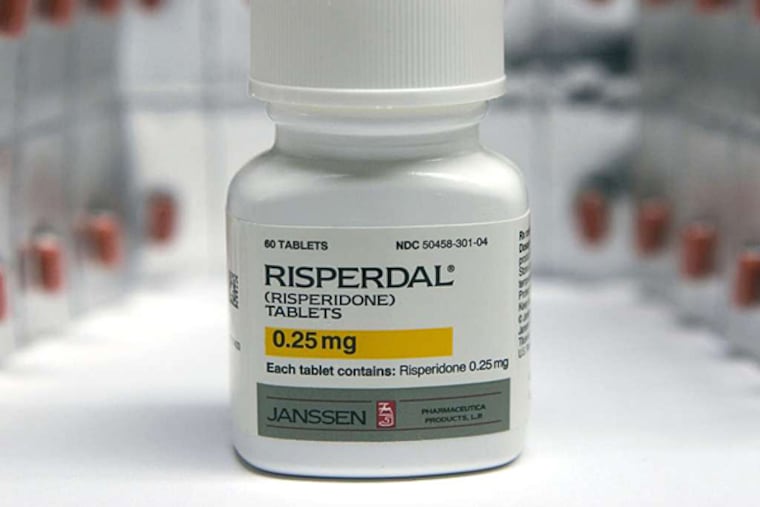Johnson & Johnson loses first Risperdal jury trial
A Philadelphia jury said Tuesday that drugmaker Johnson & Johnson should pay $2.5 million to a 20-year-old autistic man from Alabama - who developed size 46 DD breasts as a young teenager - because the company failed to adequately warn of that potential side effect from his use of the antipsychotic drug Risperdal.

A Philadelphia jury said Tuesday that drugmaker Johnson & Johnson should pay $2.5 million to a 20-year-old autistic man from Alabama - who developed size 46 DD breasts as a young teenager - because the company failed to adequately warn of that potential side effect from his use of the antipsychotic drug Risperdal.
This was the first case related to the condition called gynecomastia that went to a jury, but thousands more lawsuits are lined up in Philadelphia, California, Missouri, and other locations.
J&J paid $2.2 billion in 2013 to settle federal and state criminal and civil charges related to illegal marketing of the drug, but that did not stop individual lawsuits related to adverse events.
"The jury in Philadelphia heard evidence that was never presented to the FDA by an American drug company," said Philadelphia lawyer Thomas Kline, who represented the plaintiff, Austin Pledger, and his family. "If there was ever a clear failure-to-warn case, this was it."
Robyn Frenze, a spokeswoman for J&J's Janssen subsidiary, which makes Risperdal, said the company was "disappointed and will consider all of our options going forward, including appeals. We firmly believe this verdict should be overturned." Janssen has several facilities in Philadelphia's suburbs.
Though drug companies cannot officially promote drugs for unapproved uses, doctors can prescribe them as they see fit.
Risperdal was first approved by the Food and Drug Administration in 1993 for adults with schizophrenia. It was not approved for any use in children and adolescents until late 2006.
By then, a Janssen sales representative had made more than 20 visits to the pediatric neurologist treating Pledger in a Birmingham suburb. Pledger was given Risperdal for the first time in 2002 at age 8 because his mother sought something to help with his irritability brought on by autism.
In front of Common Pleas Court Judge Ramy Djerassi, Pledger's doctor, Jan Mathisen, testified that he was unaware of information contained in one Janssen study that suggested gynecomastia could result from use of the drug. If he had been, he said, he would have discussed it with the family. And when the drug was approved for children with autism disorder in 2006, he said, he, like many doctors, did not read the entire revised label and would have wanted someone to tell him of the increased risk.
Janssen attorney Diane Sullivan stressed to the jury that the company's label adequately conveyed the risks of using the drug.
But the plaintiffs' star witness, former FDA Commissioner David Kessler, testified that Janssen did not do enough to warn patients, doctors, and the FDA when one of its own studies showed higher levels of the hormone prolactin, which can lead to gynecomastia.
"If somebody is sending a sales rep into a doctor's office, into a pediatric neurologist's office, and doing it multiple times, you have an obligation to provide adequate direction," Kessler said. "Tell the good. Tell the bad."
Kline expects Janssen to appeal to Superior Court, and plans to appeal a 2014 decision by Common Pleas Court Judge Arnold New that punitive damages are not allowed in Risperdal cases.
University of Richmond law professor Carl Tobias, who follows pharmaceutical cases, said he thought J&J might fight a bit longer.
"I think that a plaintiff's verdict sends a message to J&J that it needs to take these cases seriously and perhaps even needs to seriously consider settling them," Tobias said. "However, I expect the company will want to try a number more and see if it can persuade juries to rule for J&J."